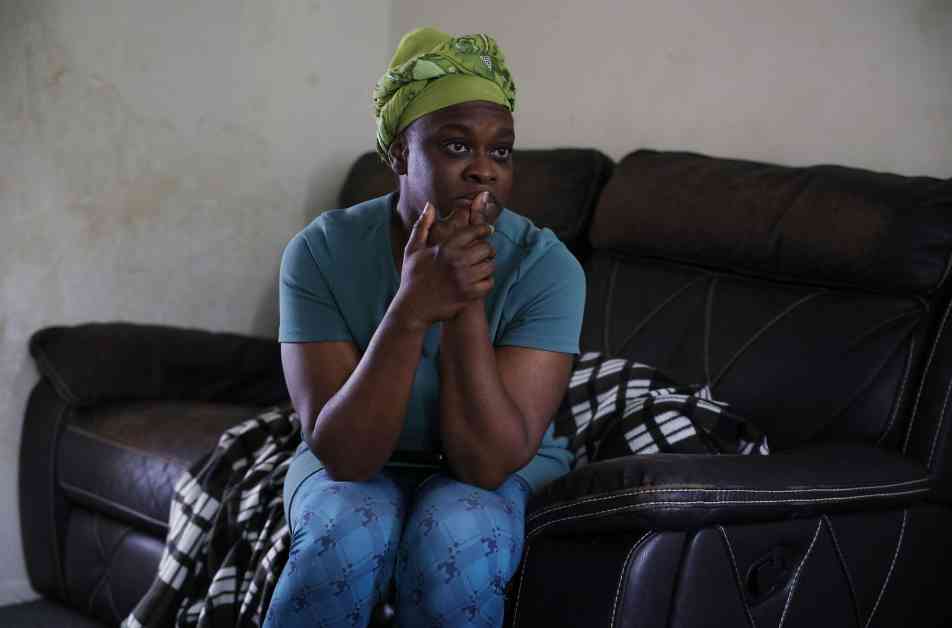Dare Olaifa-Oyeniyi, a 43-year-old mother from Bexley, is facing the daunting prospect of homelessness after being given a month by the council to leave her property. She has been living in her Erith home with her husband and three children since 2021, when they were placed there under emergency accommodation protocols by Bexley council. Despite their circumstances, Dare has been vocal about the issues they have faced in their home, including leaks, mould, and safety hazards in the back garden that pose a risk to her autistic seven-year-old son, Abdul-Quddus.
Challenges with Council Relocation Offer
In July of this year, works began to level the back garden at Dare’s property. However, on August 14, she received an email from a Bexley council officer offering her a 12-month tenancy at a three-bedroom property in Sittingbourne, Kent. The offer came with a stipulation that whether Dare accepted the offer or not, the council had fulfilled its duty to secure accommodation for her and would end its housing obligation to her. This meant that Dare would need to vacate the temporary accommodation property she was currently living in.
Feeling overwhelmed by the suddenness of the decision, Dare expressed her concerns about the offer, particularly the location of the new property in Sittingbourne. She explained, “They didn’t even give me a choice. They said there was this property in this area, Sittingbourne, and whether I accept or don’t accept they were going to end their duty.” The distance to the new property posed logistical challenges, especially for her eldest child who would have to wake up early to make the commute to school.
Confusion and Miscommunication
The council’s handling of the situation added to Dare’s anxiety. The email she received required a response by 3 pm the next day, leaving her with little time to consider her options. When Dare expressed her acceptance of the property but raised concerns about its suitability due to the location, she was met with a rushed response from the council officer. Despite requesting time for a review of the decision, the council proceeded as if Dare had agreed to the offer without addressing her concerns.
Dare’s attempt to delay the process in order to ensure a fair and informed decision was met with resistance from the council. She recounted, “It was 10.30 am, and they are expecting me to be somewhere that is two and a half hours away. They gave me a time to collect the key. The guy kept calling me, and I said my son was having tuition, and I didn’t know when I could leave.” The lack of flexibility and understanding on the council’s part only added to the stress and uncertainty that Dare was experiencing.
Consequences of Refusal
When Dare did not meet with the managing estate agent as requested, the council officer revoked the tenancy offer and sent a letter informing her that the council had ended its duty to house her. The letter accused Dare of refusing to meet the agent and failing to make a clear decision on the offer, leading to the termination of their housing obligation. This left Dare in a precarious position, unsure of her family’s future and where they would go next.
The abruptness of the council’s decision left Dare reeling, unable to sleep as she grappled with the uncertainty of her situation. She received a letter on August 21 instructing her to vacate her current home by September 29, with the threat of the council seeking possession of the property if she failed to comply. Dare expressed her distress, questioning, “I don’t even know what I’m going to do. Where do they expect me to go with the kids? Are they going to put us on the streets? Because I’m not sure.”
Seeking Support and Advocacy
Despite the challenges she faced, Dare is not alone in her struggle. Community members and advocacy groups have rallied around her, offering support and guidance in navigating the complex housing system. As she continues to fight for her family’s right to stable accommodation, Dare is determined to seek justice and raise awareness about the difficulties faced by vulnerable families in similar situations.
Moving Forward
The ordeal that Dare Olaifa-Oyeniyi has endured highlights the urgent need for reforms in the housing system to better support families in crisis. The lack of communication, understanding, and empathy from the council has only exacerbated the challenges faced by Dare and her children. As she faces the threat of homelessness, Dare’s resilience and determination serve as a reminder of the strength and courage exhibited by many in similar circumstances.
In Conclusion
The plight of Dare Olaifa-Oyeniyi sheds light on the harsh realities faced by families on the brink of homelessness due to inadequate support and misguided decisions by authorities. As she fights for her family’s right to a safe and stable home, Dare’s story serves as a call to action for policymakers, advocates, and community members to come together and address the systemic issues that perpetuate housing insecurity and displacement. It is crucial that we stand in solidarity with families like Dare’s and work towards creating a more equitable and compassionate housing system for all.

